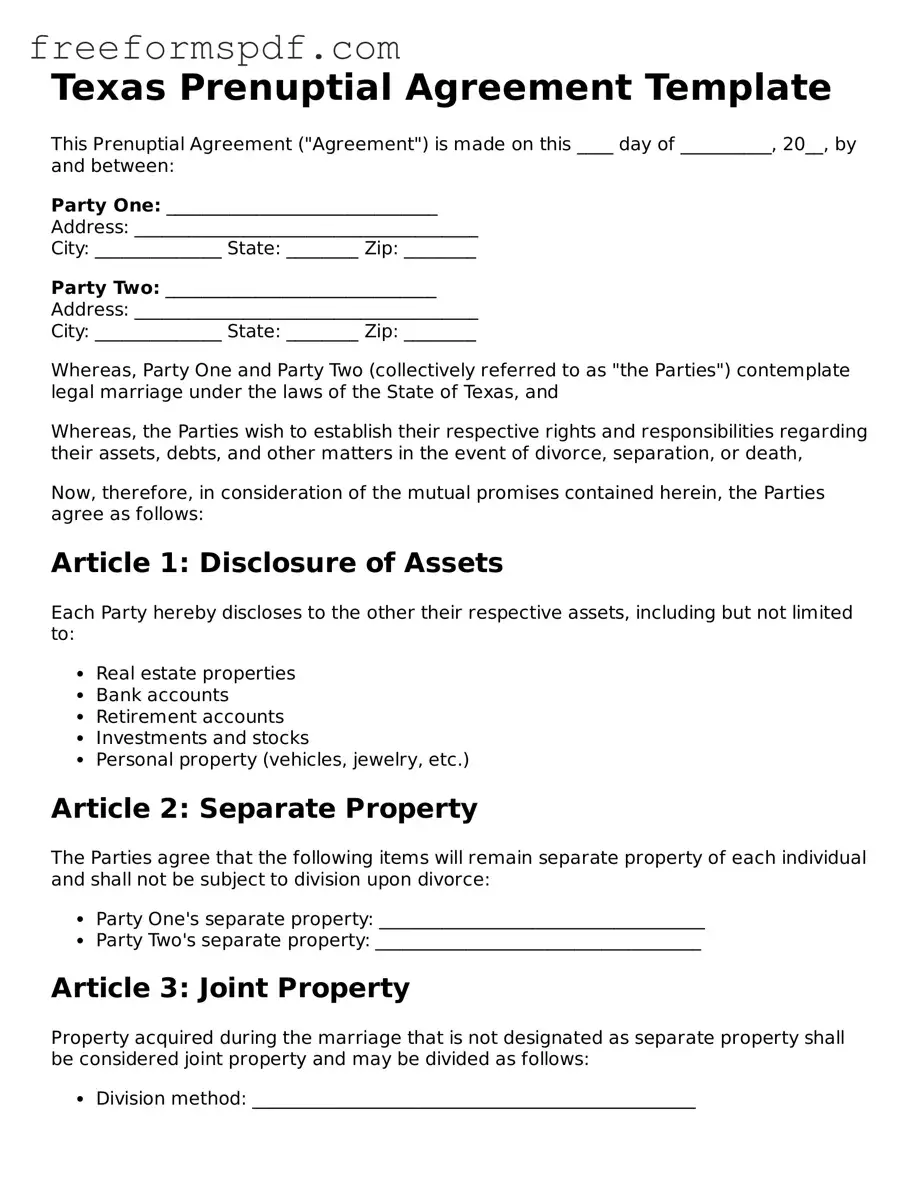Attorney-Verified Prenuptial Agreement Document for Texas State
Common mistakes
-
Incomplete Information: Many individuals fail to provide all necessary details about their assets and debts. Omitting critical information can lead to disputes later.
-
Not Considering Future Changes: Some people neglect to account for potential changes in their financial situation. A prenuptial agreement should include provisions for future income, property acquisitions, and other financial shifts.
-
Lack of Legal Counsel: It is common for individuals to fill out the form without seeking legal advice. Consulting with a lawyer can help clarify the terms and ensure that the agreement is enforceable.
-
Ignoring State Laws: Texas has specific laws governing prenuptial agreements. Failing to adhere to these regulations can render the agreement invalid.
-
Pressure or Coercion: Some individuals may feel pressured to sign the agreement quickly. It is crucial that both parties enter into the agreement willingly and without undue influence.
Learn More on This Form
-
What is a prenuptial agreement in Texas?
A prenuptial agreement, often called a "prenup," is a legal contract between two individuals before they marry. In Texas, this agreement outlines how assets and debts will be divided in the event of a divorce or separation. It can also address other financial matters, such as spousal support. Having a prenup can provide clarity and protection for both parties.
-
What should be included in a Texas prenuptial agreement?
While each prenup can be tailored to the couple's specific needs, common elements include:
- Identification of separate and community property
- Debt responsibilities
- Division of property upon divorce
- Spousal support provisions
- Any other financial arrangements or expectations
It is important to be thorough and clear to avoid misunderstandings later.
-
How do we create a prenuptial agreement in Texas?
To create a valid prenuptial agreement in Texas, both parties must agree to its terms. It is advisable to consult with separate attorneys to ensure that each party understands their rights and obligations. The agreement must be in writing and signed by both parties. Additionally, it should be executed voluntarily, without coercion or duress.
-
Can a prenuptial agreement be changed or revoked?
Yes, a prenuptial agreement can be modified or revoked after it has been executed. Both parties must agree to any changes, and these modifications should also be in writing and signed. It is important to keep in mind that any changes should be made well before any potential divorce proceedings to avoid claims of coercion.
-
Is a prenuptial agreement enforceable in Texas?
In general, prenuptial agreements are enforceable in Texas, provided they meet certain legal requirements. The agreement must be in writing, signed by both parties, and entered into voluntarily. If the agreement is found to be unconscionable or if one party did not fully disclose their assets, a court may choose not to enforce it. It is crucial to ensure the agreement is fair and transparent.
Misconceptions
Understanding prenuptial agreements in Texas can be challenging. Here are nine common misconceptions about the Texas Prenuptial Agreement form:
- Prenuptial agreements are only for the wealthy. Many people believe that only those with significant assets need a prenuptial agreement. In reality, anyone can benefit from a prenup, regardless of their financial situation.
- Prenuptial agreements are not legally binding. Some think that prenups have no legal standing. In Texas, a properly drafted and executed prenuptial agreement is enforceable in court.
- Prenuptial agreements are only about money. While financial matters are a key focus, prenups can also address other issues, such as property division and debt responsibilities.
- You cannot change a prenuptial agreement once it is signed. Many assume that prenups are set in stone. However, couples can modify or revoke their agreements at any time, as long as both parties agree.
- Prenuptial agreements are a sign of distrust. Some people view prenups as a lack of faith in the relationship. In truth, they can provide clarity and security for both partners.
- Only one party needs a lawyer. It is a common belief that only one partner requires legal representation. Both parties should have their own legal counsel to ensure fairness and understanding.
- Prenuptial agreements are only for divorce situations. While they do come into play during a divorce, prenups can also outline financial responsibilities during the marriage.
- Prenuptial agreements are complicated and hard to understand. Many think that prenups are overly complex. A well-drafted agreement can be straightforward and easy to comprehend.
- Prenuptial agreements are only necessary for first marriages. Some believe that prenups are irrelevant for those marrying for the second or third time. However, they can be beneficial in any marriage to protect individual interests.
Some Other Prenuptial Agreement State Templates
Oregon Prenup - This legal framework can encourage open communication about finances before marriage.
For those embarking on a rental journey, understanding the intricacies of a solid Lease Agreement is paramount. The online resource available at detailed Arizona Lease Agreement insights can provide valuable guidance throughout the process.
New York Prenup - A prenuptial agreement can provide a sense of security for both partners as they embark on their life together.
